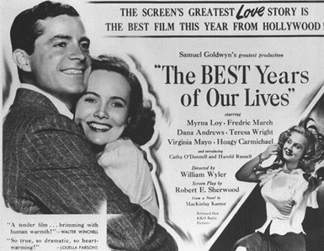
After watching The Best Years of Our Lives I found it a bit humorous to see it mentioned in another films review in this way, "My generation will forever be identified with the American Pie franchise, something that makes me continuously ashamed. Where other generations can pride themselves on The Best Years of Our Lives or Easy Rider, Wall Street or Goodfellas, we have a seemingly endless multi-million-dollar series that protracts the decades-long stereotype of apathetic, over-sexed teens." While I don't think it's neccessarily that bad, I hope that our generation has a better touchstone film than American Pie, I can't help but think of how great it would be to have The Best Years of Our Lives as the film to identify a generation with.
William Wyler directed The Best Years of Our Lives in 1946, it is a homecoming film about three World War II veterans. They return to small town America, namely Boone City, and find out that in the time they were gone certain tings have changed that they can't change back. Al's children have grown up to the point where he claims he doesn't recognize them. Fred's wife has moved out of his parents house and may have fallen out of love with him. And then, there is Homer (played by real life war veteran Harold Russell) who has lost his hands in the war, and now goes home to a family and a girlfriend who want only to care for him, even as he wants only to be treated normal. These three veterans meet on their plane trip home to Boone City and share a cab ride while dropping eachother off at their houses. They forge an immediate bond as veterans from the same town and make plans to meet for drinks soon.
The hardship of adjustment comes nearly instantly. Homer doesn't know how or want to hold his girl with his new hands. Al struggles to initially connect with his wife, and is pressured back into work immediately. The best job Fred can find is back at a drugstore working under a guy he used to supervise, oh and he and his wife can't stand eachother. There are struggles at work, talks of divorce and homewrecking, an underlying sentiment that some people don't get the risks the veterans took for their country, yet somehow this remains one of the least cynical films I have ever seen.
The talks of divorce had to be a bit controversial in 1946. And, one would imagine so would have putting so plainly teh struggles of the veterans to get respect at home. Not to mention having a real life war amputee in a lead role. But beyond all this is a true American poulist film that just could not be made in 2007. In on scene a man at a soda fountain tells a veteran he was a sucker for fighting the war, that we fought the wrong people, that all the facts are in the paper and all he has to do is read the facts. The veteran was taken back by this. This is in 1946. Such a scene in 2007 would seem absurd. In our media oversaturated culture everyone already knows there are millions with dissenting viewpoints to every view out there.
The film lasts three hours, and in the end you wind up believing and knowing that something good will happen for these characters and it does. The predictability of the plot does not even for an instant take away from the enjoyment of following these characters and wishing for that good you know that will come. It's hard to imagine that this generation will be identified with a film that matches this in stature.
1 comment:
THis is the kind of films I like to see because it's perfect to be involved into retro style,actually when I'm going to the cinema I like wearing like the characters, crazy you know.
Post a Comment